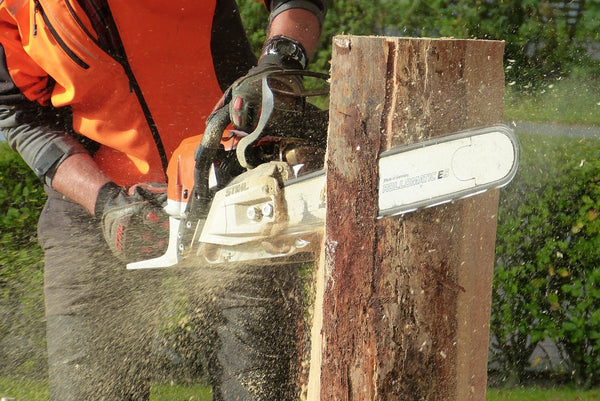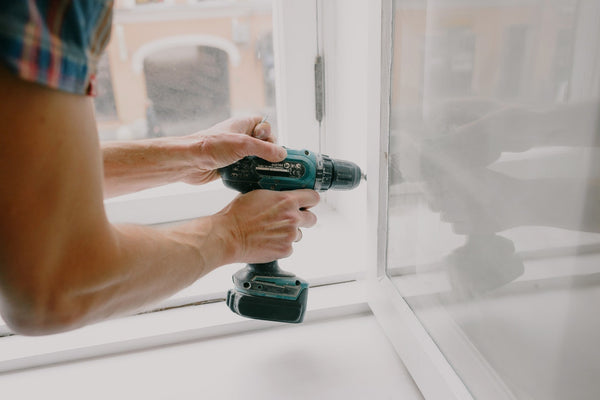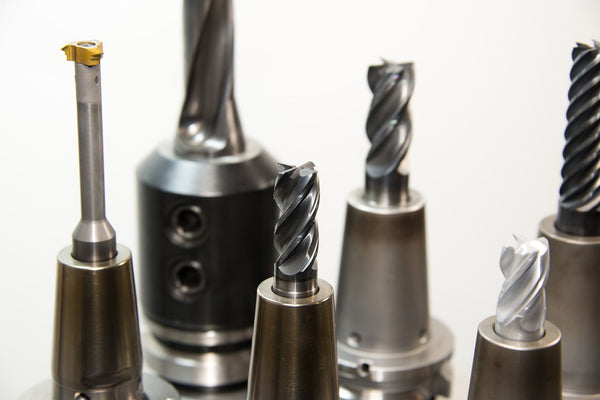Choosing the right power tool is an important decision. Whether you're a seasoned pro or just starting out, it's always a good idea to consider all of your options before making any purchase. That's why we'll be discussing the top factors to consider when buying power tools for the first time.
1. Weight and handling

The weight of a power tool is incredibly important to take into consideration. Heavier tools can make long hours of work more difficult to manage. This can be taxing on the body, which may lead to problems down the road. On the other hand, lighter tools are more comfortable to carry around for long periods. It'll make the task at hand easier to manage. Of course, you'll want to go with a lighter power tool, but only if it can finish the job properly.
Power tools can vary dramatically in weight, even for the same type of tools. It all depends on the model. Most people would consider anything over twenty-five pounds (or even less) too heavy, but it really depends on the type of work you plan on doing. If you plan to use your power tool for a short period, it could even be a good idea to invest in a slightly heavier tool as they provide more torque. However, if you can find a lighter version with the same torque, go for that instead. For example, a tool such as the Supersaw has proven to be just as powerful as a gas-powered chainsaw. It's been designed like a chainsaw but more compact, lightweight, and convenient.
Handling power tools can definitely be dangerous. Always go for something that's easy for you to handle. We're talking about you, specifically. If you find that a tool is too hard to handle safely, don't use it at all.
2. Should you go for corded or cordless?
Cordless power tools are usually a good choice for people who don't have enough space to store heavy-duty equipment. They're typically less expensive and come in many sizes. When looking at cordless options, check out the battery power. You'll want to see how long a full charge will last you so you can decide if it will be enough for the work you're doing. Keep in mind that more powerful tools such as miter saws require heavier duty batteries with longer charging times compared to a compact drill.
The main benefits of using cordless power tools include:
- Being more compact and convenient to use compared to their corded counterparts.
- Take up less space in storage areas like garages or sheds—cordless machines also easily fit inside the trunk of most cars.
- Some stationary models even come equipped with wheels to help you get them easily from one place to another.
- Usually designed to operate quietly.
On the other hand, corded power tools can offer more force and torque because they're plugged into a power outlet. They can be harder to store, but they usually have higher performance than their counterparts. However, that's not always the case.
Using the Supersaw as another example, even though it's compact, lightweight, and powerful, it still is battery-powered. You just have to find the right tool that can accommodate your needs. With corded power tools, you don't have to worry about battery life. Whether you decide to go with corded or cordless power tools, it all depends on the type of work you're doing. If it requires heavy-duty tools with high torque, choose something that can accommodate wisely.
The main benefits of using corded power tools include:
- Usually provides more power and torque needed for heavy-duty work.
- You're able to use the tools for as long as you'd like without worrying about battery life.
- Can be lighter than cordless models as they don't require batteries.
3. Determine how often you'll use the power tools

If you're a contractor or professional, you may use your power tools more frequently than others. For those looking to purchase power tools for home projects and occasional weekend jobs, you're likely to use the tools less frequently. So, as you're shopping for power tools, decide whether they'll be worth the investment based on how frequently you use them. If you're only using a tool occasionally, you may want to go for a cheaper model.
However, it's entirely up to you. If you believe you'll continue to use a more expensive tool for years to come, even if you use it just a few times a year, it could still be a good investment. Before committing to any purchase, ask yourself these questions:
- What are the projects I'll be using these tools for?
- How often will I need to charge my battery?
- How often will I use each tool I'm buying?
4. Size
Size is another incredibly important factor to consider, especially if you're working in a tight space and can't maneuver around freely. As you know, handling power tools can be very dangerous. So, if you're unable easily to maneuver a tool around, you're putting yourself and others at risk.
Power tools are made in many different sizes. Usually, the larger the size, the more torque it will have to complete more difficult projects such as cutting metal. However, larger tools can be tougher to maintain and are not as portable. If you plan to use your power tool for a short period and don't need much torque, buying a smaller and more compact tool may be better. This is especially true if you can find a tool like the Supersaw, which can provide superior torque in a compact size.
5. Think about your budget

When it comes to budget, you need to set realistic expectations. You can't expect to buy the cheapest tool and have it last as long or be used as often as an expensive power tool. If you're looking for something that you'll need to replace regularly, then less expensive models might be better.
Really take some time to consider the cost when debating on power tools. For every model you look at, ask yourself, are they missing features you can't live without? Are there any specific features you need? Remember, buying power tools can be expensive. You may even need to purchase multiple tools, so you must consider your budget carefully. Focus on the value of each tool and compare it to your budget.
For budgeting, the size of the projects you'll be working on also matters. Think about the type of work you'd be doing with the tools and their complexity before making a purchase. If you know a project will be difficult, it may be worth spending more money on a professional model with stronger and more versatile features. The more complex the project, the more expensive and powerful tool you may need.
6. Are there positive product reviews?
Of course, you should never purchase any power tool without doing some research first. Always go online to read reviews and look for the most recent ones. The recent reviews will give you a good idea of someone's opinion who recently bought and used the tools. Reviews are a great way to find out how durable and powerful the machine is, what its strengths and weaknesses are, and whether it's worth the money.
Keep in mind that all reviews are subjective. One person's opinion may be completely different from another, including yours. In other words, if someone says a power tool is bad because of a specific feature, you might completely disagree. Therefore, you should only take reviews into consideration. Use your best judgment and do some research to decide whether do you agree with the review.
We recommend that you also look at video reviews as they're usually more honest with their reviews. Video reviews also prove that person reviewing the product has purchased and used the power tool. These can be far more trustworthy than a written review.
7. Warranties

The length of your warranty is another big consideration. If you're uncertain about which tools are best for the jobs you need them for, go with a more model with a longer warranty. You may be given a warranty that allows you to return a tool for free within 90 days. This gives you enough time to use a tool and see how it works for your line of work.
If possible, consider purchasing from retailers with a satisfactory return policy. This way, you're not stuck with tools that may or may not work for your needs. You can also return anything that turns up defective.
8. What are your specific needs, and will the tools last?
Once you know the type of power tool you need, you need to understand your specific needs. It will be a lot of unnecessary work to return something that's missing some key features you need for your work. For example, if you're looking to replace a saw with a laser guide, you'll need to get one that actually has a laser guide. You can't just purchase any saw as it may not have the guide you need.
When figuring out your needs, durability plays a big factor. Regardless of the tool you need, you want something that's durable and built to last--at least long enough. For example, before purchasing any power drill, make sure you research the specific features you need and then compare which ones will likely last in durability. A great way to find out how well a specific model has held up over time is by reading online reviews.
9. Do you need to purchase anything extra with the power tool?

Sometimes when you buy new power tools, you may have to purchase accessories to go with them. And while these extras might be optional, they can help make your job easier in the long run. So ask yourself, do you need to purchase anything extra with the power tool?
Let's use a heavy-duty drill as an example. With it, some common accessory purchases include impact driver bits and an air compressor or portable tire pump. These items will provide more versatility than using the drills alone. You may also consider the SuperSocket, a handy tool that can unscrew any bolt with ease.
Some other helpful accessories may include chisels and gouges, which allow woodworkers to cut into tough surfaces like hardwood flooring without damaging it. There are bullnose blades that square off edges left by circular saws and jigsaws; metal cutting blades that can slice through steel, aluminum, and brass; a belt sander or wire brush for removing rust from metal surfaces. The list goes on.
Going back to the drill, it may not work without a set of bits or blades. And although these are additional costs, they're required for most applications. So, be sure to factor in the cost of these extra purchases when considering which power tools to buy.
10. Brand names or generic brands
When shopping for power tools, you'll definitely come across brand name tools and generic brands. A reputable brand name can be an indication of good quality, performance, and durability. Our branded products, for example, focus on delivering the most practical and highest-quality tools on the market. Whereas generic brands may try to copy the tools we offer but at a lower quality.
Brand names can be more expensive than generic brands, but the tradeoff is usually worth it. On the other hand, some generic brands have poor customer service, don't offer warranties, and manufacture products with short life spans. It can be hard to find a quality generic brand, which is why you should do extensive research before purchasing any power tool. Ultimately, it comes down to what works best for your specific needs and budget considerations.
















![SuperSocket & Ratchet Adapter Bundle [Limited Time Sale]](http://cdn.shopify.com/s/files/1/0457/1650/4740/products/10SocketBundle_4b6136be-c43b-4337-a556-d27ffddad9a5_160x.jpg?v=1637865366)


